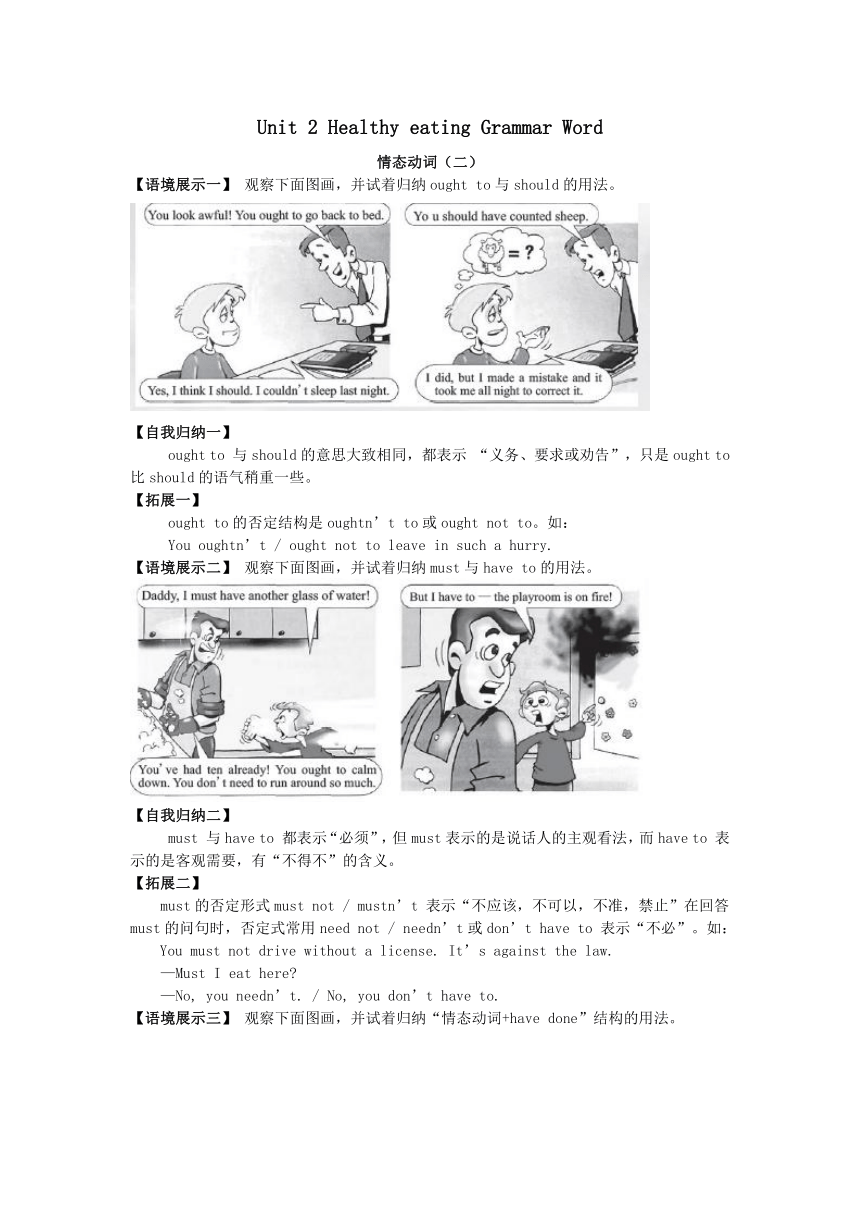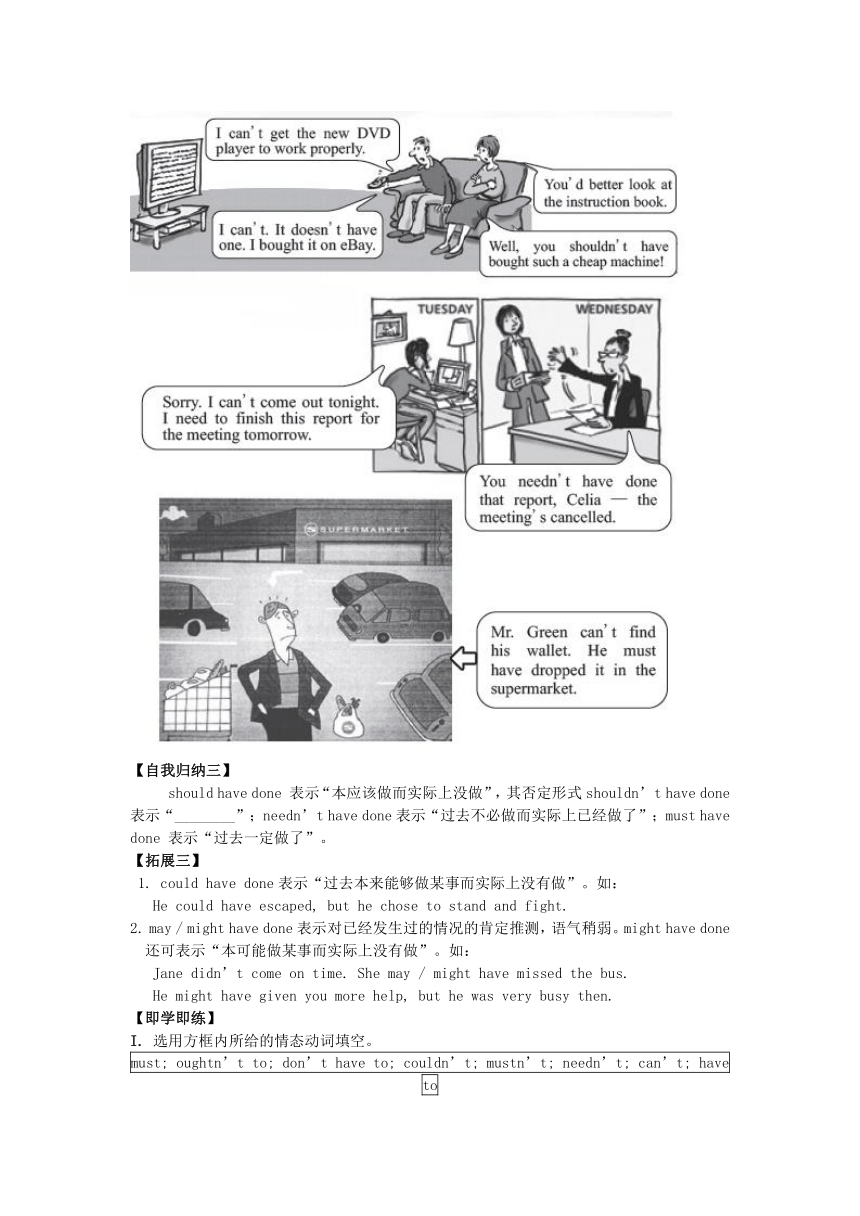2015-2016学年高中英语 Unit 2 Healthy eating Grammar Word同步讲练(含答案)
文档属性
| 名称 | 2015-2016学年高中英语 Unit 2 Healthy eating Grammar Word同步讲练(含答案) |

|
|
| 格式 | zip | ||
| 文件大小 | 453.3KB | ||
| 资源类型 | 教案 | ||
| 版本资源 | 人教版(新课程标准) | ||
| 科目 | 英语 | ||
| 更新时间 | 2016-04-15 20:09:57 | ||
图片预览


文档简介
Unit 2 Healthy eating Grammar Word
情态动词(二)
【语境展示一】 观察下面图画,并试着归纳ought to与should的用法。
【自我归纳一】
ought to 与should的意思大致相同,都表示 “义务、要求或劝告”,只是ought to比should的语气稍重一些。
【拓展一】
ought to的否定结构是oughtn’t to或ought not to。如:
You oughtn’t / ought not to leave in such a hurry.
【语境展示二】 观察下面图画,并试着归纳must与have to的用法。
【自我归纳二】
must 与have to 都表示“必须”,但must表示的是说话人的主观看法,而have to 表示的是客观需要,有“不得不”的含义。
【拓展二】
must的否定形式must not / mustn’t 表示“不应该,不可以,不准,禁止”在回答must的问句时,否定式常用need not / needn’t或don’t have to 表示“不必”。如:
You must not drive without a license. It’s against the law.
—Must I eat here
—No, you needn’t. / No, you don’t have to.
【语境展示三】 观察下面图画,并试着归纳“情态动词+have done”结构的用法。
【自我归纳三】
should have done 表示“本应该做而实际上没做”,其否定形式shouldn’t have done表示“________”;needn’t have done表示“过去不必做而实际上已经做了”;must have done 表示“过去一定做了”。
【拓展三】
1. could have done表示“过去本来能够做某事而实际上没有做”。如:
He could have escaped, but he chose to stand and fight.
2. may / might have done表示对已经发生过的情况的肯定推测,语气稍弱。might have done还可表示“本可能做某事而实际上没有做”。如:
Jane didn’t come on time. She may / might have missed the bus.
He might have given you more help, but he was very busy then.
【即学即练】
I. 选用方框内所给的情态动词填空。
must; oughtn’t to; don’t have to; couldn’t; mustn’t; needn’t; can’t; have to
1. You ________ go on working because you look so tired now.
2. The weather turned out to be fine yesterday. I ________ have taken the trouble to carry my umbrella with me.
3. Li Hua ________ pass an examination before he can start work.
4. You ________ come to the meeting if you’re too busy.
5. You ________ play now! You shall finish your homework first!
6. I know things are hard with you, but you ________ try to get over the difficulties.
7. I didn’t see her at the meeting this morning; she ________ have spoken at the meeting.
8. You ________ imagine what difficulty we had walking home in the snowstorm.
II. 根据汉语提示,将下列句子补充完整。
1. We ________ ________ ________ (本应该到达) at lunchtime but our flight was late.
2. Mark ________ ________ ________ (本不需要着急). After running all the way, he arrived ten minutes early.
3. The teacher did not regret saying what he did but felt that he ________ ________ ________ ________ ________ (本可以用不同的方式表达).
III. 从括号内选择合适的内容完成下面对话。
A husband (H) and wife (W) are driving to a party and are lost.
W: We’re lost. And we don’t even have a map. You 1. ________ (should take / should have taken) a map.
H: I didn’t think we were going to need one. I 2. ________ (must have made / should have made) a wrong turn.
W: Do we need to stop and ask for directions
H: No, we 3. ________ (mustn’t / don’t have to). We 4. ________ (can / must) use the cell phone and call the Allens and ask them how to get to their house.
W: OK.
H: Let’s see. I thought I had the cell phone in my pocket. I 5. ________ (can’t / ought to) find it. I 6. ________ (must leave / must have left) it at home.
W: No, You didn’t leave it at home. I’ve got it here in my purse. Oh, no. It is out of power. We 7. ________ (have to / may) look for a pay phone. Do you have any change
H: I just have dollar bills.
W: You 8. ________ (should have taken / must have taken) some change with you.
H: Oh, it’s my fault.
W: Watch out! You 9. ________ (might have hit / must have hit) that car.
H: I wasn’t going to hit that car. I didn’t come anywhere close to it.
W: Anyway we 10. ________ (ought to / can) be careful.
参考答案
【自我归纳三】本不应该做而实际上做了
【即学即练】
I. 1. oughtn’t to 2. needn’t 3. has to 4. needn’t / don’t have to
5. mustn’t / oughtn’t to 6. must 7. couldn’t / can’t 8. can’t
II. 1. should have arrived 2. needn’t have hurried 3. could have expressed it differently
III. 1. should have taken 2. must have made 3. don’t have to 4. can 5. can’t
6. must have left 7. have to 8. should have taken 9. might have hit 10. ought to
情态动词(二)
【语境展示一】 观察下面图画,并试着归纳ought to与should的用法。
【自我归纳一】
ought to 与should的意思大致相同,都表示 “义务、要求或劝告”,只是ought to比should的语气稍重一些。
【拓展一】
ought to的否定结构是oughtn’t to或ought not to。如:
You oughtn’t / ought not to leave in such a hurry.
【语境展示二】 观察下面图画,并试着归纳must与have to的用法。
【自我归纳二】
must 与have to 都表示“必须”,但must表示的是说话人的主观看法,而have to 表示的是客观需要,有“不得不”的含义。
【拓展二】
must的否定形式must not / mustn’t 表示“不应该,不可以,不准,禁止”在回答must的问句时,否定式常用need not / needn’t或don’t have to 表示“不必”。如:
You must not drive without a license. It’s against the law.
—Must I eat here
—No, you needn’t. / No, you don’t have to.
【语境展示三】 观察下面图画,并试着归纳“情态动词+have done”结构的用法。
【自我归纳三】
should have done 表示“本应该做而实际上没做”,其否定形式shouldn’t have done表示“________”;needn’t have done表示“过去不必做而实际上已经做了”;must have done 表示“过去一定做了”。
【拓展三】
1. could have done表示“过去本来能够做某事而实际上没有做”。如:
He could have escaped, but he chose to stand and fight.
2. may / might have done表示对已经发生过的情况的肯定推测,语气稍弱。might have done还可表示“本可能做某事而实际上没有做”。如:
Jane didn’t come on time. She may / might have missed the bus.
He might have given you more help, but he was very busy then.
【即学即练】
I. 选用方框内所给的情态动词填空。
must; oughtn’t to; don’t have to; couldn’t; mustn’t; needn’t; can’t; have to
1. You ________ go on working because you look so tired now.
2. The weather turned out to be fine yesterday. I ________ have taken the trouble to carry my umbrella with me.
3. Li Hua ________ pass an examination before he can start work.
4. You ________ come to the meeting if you’re too busy.
5. You ________ play now! You shall finish your homework first!
6. I know things are hard with you, but you ________ try to get over the difficulties.
7. I didn’t see her at the meeting this morning; she ________ have spoken at the meeting.
8. You ________ imagine what difficulty we had walking home in the snowstorm.
II. 根据汉语提示,将下列句子补充完整。
1. We ________ ________ ________ (本应该到达) at lunchtime but our flight was late.
2. Mark ________ ________ ________ (本不需要着急). After running all the way, he arrived ten minutes early.
3. The teacher did not regret saying what he did but felt that he ________ ________ ________ ________ ________ (本可以用不同的方式表达).
III. 从括号内选择合适的内容完成下面对话。
A husband (H) and wife (W) are driving to a party and are lost.
W: We’re lost. And we don’t even have a map. You 1. ________ (should take / should have taken) a map.
H: I didn’t think we were going to need one. I 2. ________ (must have made / should have made) a wrong turn.
W: Do we need to stop and ask for directions
H: No, we 3. ________ (mustn’t / don’t have to). We 4. ________ (can / must) use the cell phone and call the Allens and ask them how to get to their house.
W: OK.
H: Let’s see. I thought I had the cell phone in my pocket. I 5. ________ (can’t / ought to) find it. I 6. ________ (must leave / must have left) it at home.
W: No, You didn’t leave it at home. I’ve got it here in my purse. Oh, no. It is out of power. We 7. ________ (have to / may) look for a pay phone. Do you have any change
H: I just have dollar bills.
W: You 8. ________ (should have taken / must have taken) some change with you.
H: Oh, it’s my fault.
W: Watch out! You 9. ________ (might have hit / must have hit) that car.
H: I wasn’t going to hit that car. I didn’t come anywhere close to it.
W: Anyway we 10. ________ (ought to / can) be careful.
参考答案
【自我归纳三】本不应该做而实际上做了
【即学即练】
I. 1. oughtn’t to 2. needn’t 3. has to 4. needn’t / don’t have to
5. mustn’t / oughtn’t to 6. must 7. couldn’t / can’t 8. can’t
II. 1. should have arrived 2. needn’t have hurried 3. could have expressed it differently
III. 1. should have taken 2. must have made 3. don’t have to 4. can 5. can’t
6. must have left 7. have to 8. should have taken 9. might have hit 10. ought to
同课章节目录
